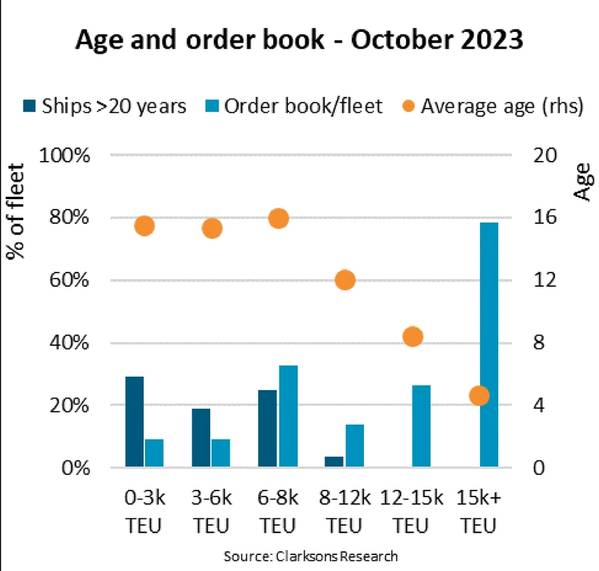
Global container ship fleet is showing its age, reaching highest average age on record of 14.2 years.
“Container ships have reached their highest average age yet at 14.2 years, the highest average age of the three main shipping sectors. The dry bulk fleet has an average age of 11.9 years whereas tankers on average are 12.8 years old,” says Niels Rasmussen, Chief Shipping Analyst at BIMCO.
The average age of the container fleet has increased 4.3 years during the past 13 years with the average age hitting a recent low of 9.9 years in August 2010. The 2,516 ships delivered, and 1,384 ships recycled since then, have not been sufficient to keep the average age down.
Currently, 21% of ships in the container fleet are now older than 20 years and thereby prime candidates for recycling in the coming years. Of the ships older than 20 years, the size segments 0-2,999 TEU and 3,000-5,999 TEU contribute 76% and 16% respectively, highlighting that fleet renewal in the past years has been focused on the post-panamax segments.
“Perhaps more importantly, nearly 70% of all container ships are over 10 years old. All ships built according to slow steaming principles so far, have been delivered within the last 10 years, allowing for lower energy consumption per container carried,” says Rasmussen.
The current order book still focuses on the largest ships, and the number of ships on order in the size segments below 6,000 TEU is significantly below the number of ships older than 20 years in the same segments.
In the 0-2,999 TEU segment 317 ships are on order, but 994 ships are more than 20 years old. Similarly, the size segment 3,000-5,999 TEU has 210 ships older than 20 years but only 100 ships on order.
Despite the significant downturn experienced in container freight rates during the past 15 months, recycling of ships during 2023 has remained low compared with the past 10 years. In the first nine months, 57 ships have been recycled compared to 81 on average during the previous 10 years.
“The order book contains 750 ships to be delivered before the end of 2025. Depending on the number of ships recycled, this should allow the average age to decline and the average energy efficiency of ships within all size segments to increase. In addition, the share of ships able to use alternative low carbon fuels will increase,” says Rasmussen.



